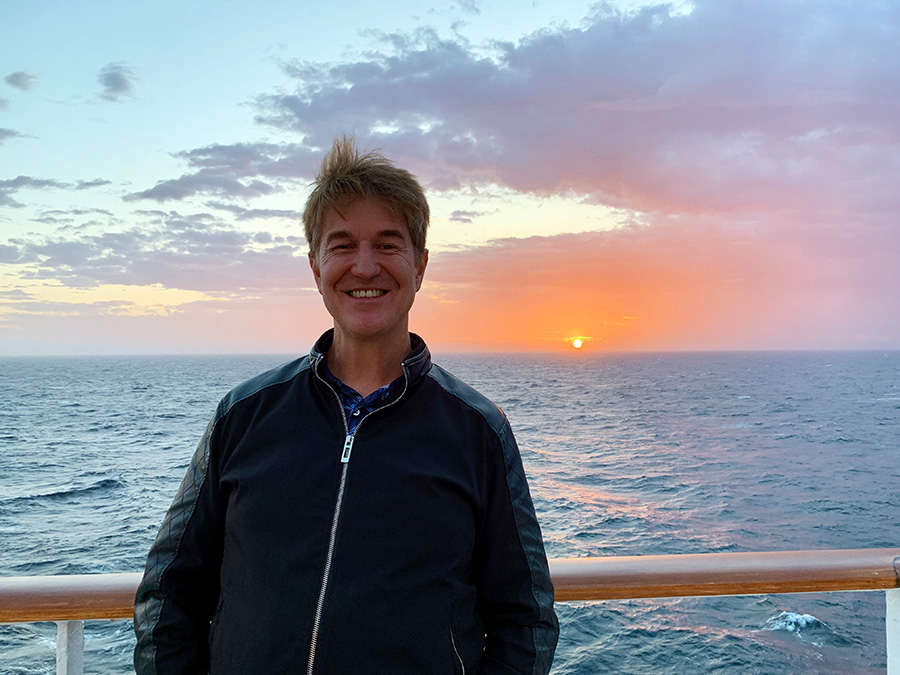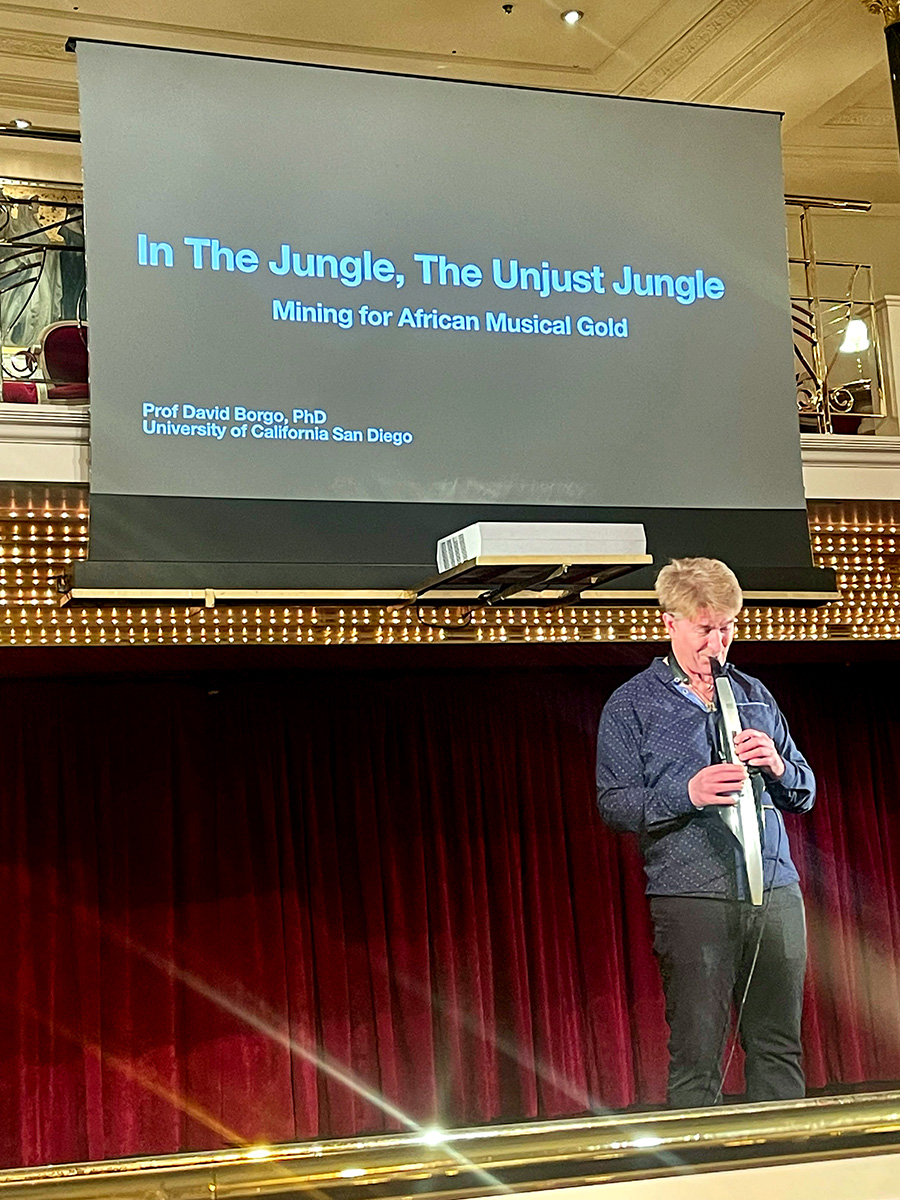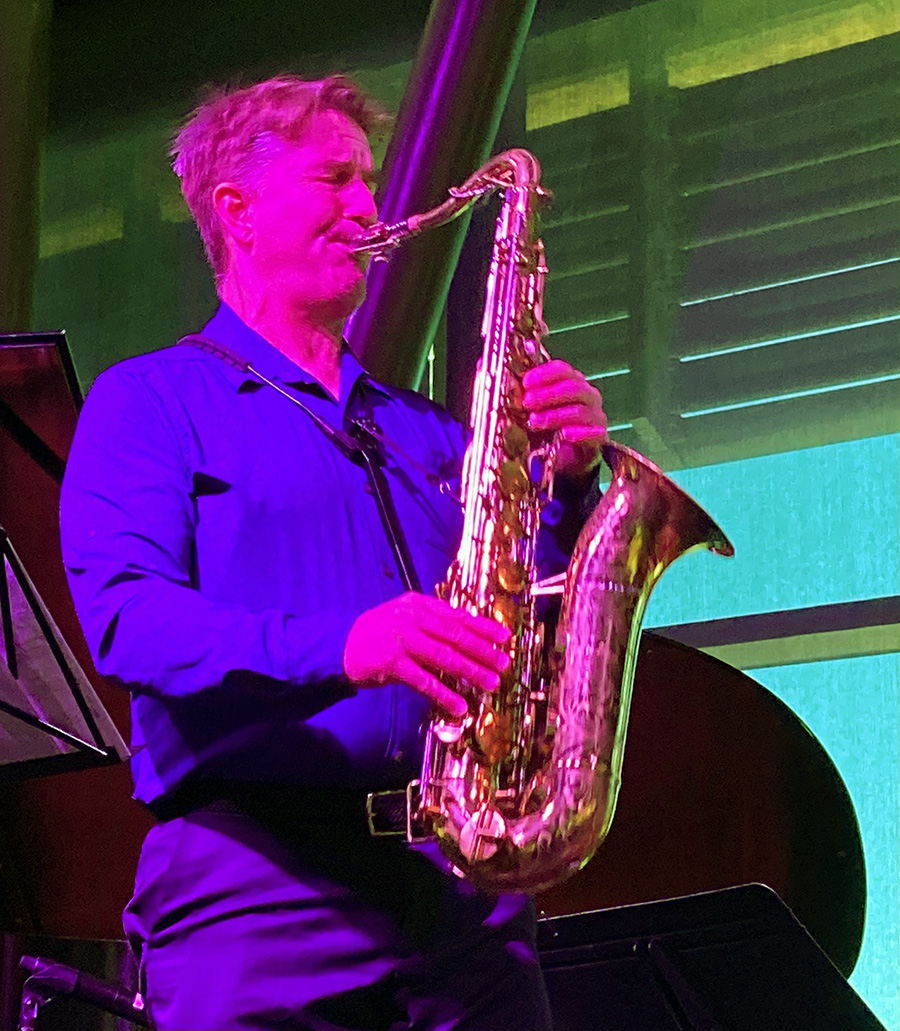Featured Stories
David Borgo’s World Cruise Inspires a New Collection of Songs

David Borgo at sunset on the sea.
Perhaps it was the fact that this time when he signed up to teach music aboard a cruise ship for the Semester at Sea program, David Borgo was not joined by his family.
And so he came back from four months spent sailing from India to Germany with a whole passel of new songs he’d written, songs he said were influenced by the sounds he heard during the various ports of call.
The UCSD music professor and working jazz musician whittled that down to seven compositions that he and his band will premiere at Dizzy’s.
“We’re going to play at Dizzy’s on June 6, and then record at Peter Sprague’s studio the day after,” Borgo said during a recent telephone interview.
“I guess they all reflect, to some degree, my experiences in these wonderful ports of call. We visited 11 ports, but I chose seven that had a particular influence on me.
“One inspiration was the idea of a two-bass, two-drum saxophone ensemble. It’s been done, but infrequently. And I like the idea of having the propulsive rhythm of two drummers. Tommy Babbin, one of the bassists will be playing acoustic, and Harley Magsino will be playing electric. The electric bass can also play as a second horn, and the way Harley plays, it can also fill in for a guitar or keyboards.
“One of the drummers is Nathan Hubbard, who is going to double on vibraphone.”
Mark Ferber, the second percussionist, fills out the ensemble.
“I provide a kind of melodic and harmonic skeleton, and let the improvisers run with it.”
For those unfamiliar with the Semester at Sea, Borgo described it as a “floating college campus.”
“It’s an independent program, but it’s affiliated with Colorado State University and the students earn credit. They bring faculty and students and staff for a semester offering college along the way.

Teaching on board for the Semester at Sea program.
“I was the music person, there were a couple theater people who were very good, a few literature professors, a historian, and couple psychology professors. I even taught a class on music psychology. Then there were a few kind of business and marketing side of things. I think they’re even trying to bring some engineers in the future because there are a lot of engineers who could use that cultural side of things! There was an oceanographer, and he did a lot of little experiments with the students.
“It’s about 50-50 where you’re on the ship and in port. In each port, you’re actually there for four or five days, which is long enough to get a sense of the place. The first day you do all the touristy things, and then you can start exploring.”
Borgo said about 500 students participated on the just-completed semester.
“We started in Dubai, and then we went to Mumbai, Mombassa, Aqaba, and went through the Suez Canal. We went to Cypress, Greece, Croatia, then to Spain, Morocco, Portugal and ended in Hamburg, Germany.”
Borgo said the strength of the influence of the different cultures varies through the series of seven compositions.
“In a couple cases, it’s fairly explicit; in others, it’s a little less obvious. ‘Dubrovnik’ is in 11/8, which is common in the Balkans.
“ ‘Lisboa,’ which is Portugese for Lisbon, where there’s a music called fado—which is super-emotional—so I wrote a piece that, at least for me, is sort of in that tradition. The harmony is pretty interesting but a little less extended than your typical jazz composition and more about the emotional content.
“Mumbai is a wonderfully intense, crazy city, with lots of activity, and the music, I think, will reflect that. A few of the others are a bit more open—where I just wrote a melody that we’re going to improvise around.”
As mentioned, the day after the Dizzy’s show, the ensemble will head into the studio to record those same seven songs.
“We’re going to do it in one day, hopefully. An hour per composition is doable, I think.
“I’ve done the past two recordings at Spragueland. I just like the vibe there. Peter is great to work with—he has great ears, both as a guitarist and an engineer. The rough mixes almost sound like the finished mix because he knows how to capture instruments so well.”

While some of Borgo’s previous recordings have been fairly avant-garde, he pointed out that his most recent releases have been closer to mainstream jazz.
So, what to expect from this upcoming project?
“I’m trying some less common instrumentation, which opens up some possibilities. I always exist somewhere between those two worlds” of jazz and the avant-garde. “As I get older, I hope I manage to exist in one world that contains both those worlds.”
When asked if the avant-garde hasn’t become a bit stuck stylistically since the late 1960s, when structure and form were largely abandoned by artists such as John Cage, the Art Ensemble of Chicago, and Yoko Ono, Borgo offered up a thoughtful explanation of his view of avant-garde and its role in the arts and society.
“Cage, and others you mentioned, invited us to hear all sound as musical. If all sound is musical, then how do we construct our music? I think the way to think about it, at least for me, is less about the structural definition and more about the social definition.
“What are the other musicians bringing to the performance: What is their history, where are they emotionally. And what are you bringing to the performance, what is your history, where are you emotionally?
“And then it becomes a social interaction as much as an artistic interaction.
“For the audience, it’s a bit like observing a conversation in a foreign language you don’t understand. You can still get a sense of is this person upset, is there a call and response? I think those still come through.
“It also invites the listener into the exact same adventure that the musicians are in—they’re taking the same risks the musicians are. I would say it’s definitely best to listen to live. If you listen to a conversation on a recording, you expect it to be more of a scripted dialogue. But if you’re there, you’re more likely to overlook any grammatical mistakes or pauses or flubbed lines.”
As a professor of music, Borgo said he sees differences in his students compared to where he was when he was a student.
“In some ways, Cage did invite us to hear all sounds, particularly nature sounds as musical, and the digital age invites us to hear all those synthesized sounds as music. So, the students today have a much wider palette; they are less interested in notes and more interested in timbre and noise. Those are kind of avant-garde ideas.”
He also observed that there seems to be less emphasis by students as to whether they plan to work as performers or teachers than what he experienced.
“When I went through school, there was kind of a divide between: you’re just going to be a saxophone player who doubles and will be a gigging musician” and those who planned to teach.
“I aspired to that for a while, and I’ve certainly done a lot of gigs over the years. I find that less interesting these days. I am drawn to finding out what is important. That means getting rid of all the things you thought you had to do and focusing on what you love to do.”
The David Borgo Quintet will be at Dizzy’s on June 6, 8pm.










